What is jihadism?
- Published

A BBC investigation has found that more than 5,000 people around the world died during November as a result of violence caused by al-Qaeda, its offshoots and groups which subscribe to a similar ideology, commonly referred to as "jihadism".
What does jihad mean?
The word "jihad" is widely used, though often inaccurately, by Western politicians and media.
In Arabic, the word means "effort" or "struggle". In Islam, it could be an individual's internal struggle against baser instincts, the struggle to build a good Muslim society, or a war for the faith against unbelievers.

What is the difference between jihadists and Islamists?
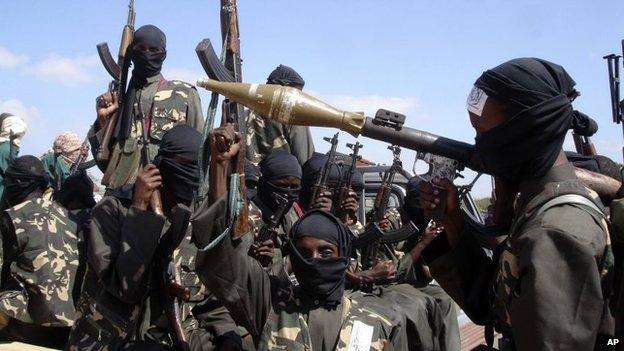
Al-Shabab is battling the government in Somalia and is linked to a string of attacks in neighbouring Kenya
The term "jihadist" has been used by Western academics since the 1990s, and more widely since the 11 September 2001 attacks, as a way to distinguish between violent and non-violent Sunni Islamists.
Islamists aim to reorder government and society in accordance with Islamic law, or Sharia.
Jihadists see violent struggle as necessary to eradicate obstacles to restoring God's rule on Earth and defending the Muslim community, or umma, against infidels and apostates. If the umma is threatened by an aggressor, they hold that jihad is not just a collective obligation (fard kifaya), but an individual duty (fard ayn) that must be fulfilled by every able Muslim, just like ritual prayer and fasting during Ramadan.
The term "jihadist" is not used by many Muslims because they see it as wrongly associating a noble religious concept with illegitimate violence. Instead, they use delegitimising terms like "deviants".

Do all jihadists want the same thing?

The late Doku Umarov proclaimed the creation of the Caucasus Emirate in 2007
Jihadists share the basic aims of advancing Islam and countering danger to it, but their priorities can vary. A recent study by Thomas Hegghammer of the Norwegian Defence Research Establishment, external identified five prominent objectives:
Changing the social and political organisation of the state. For example, the Armed Islamic Group (GIA) and the former Salafist Group for Preaching and Combat (GSPC) fought a decade-long war with Algeria's security forces with the aim of toppling the government and creating an Islamic state.
Establishing sovereignty on a territory perceived as occupied or dominated by non-Muslims. The Pakistan-based Lashkar-e-Taiba (Soldiers of the Pure) is opposed to Indian control of Kashmir, while the Caucasus Emirate wants an Islamic state throughout the "Muslim lands" in the Russian Federation.
Defending the umma from external - non-Muslim - threats. This includes jihadists focused on fighting what they call the "near enemy" (al-adou al-qarib) in confined areas - such as Arabs who travelled to Bosnia and Chechnya to defend local Muslims against non-Muslim armies - and "global jihadists" who target the "far enemy" (al-adou al-baid), which in most cases is the West - many of whom are affiliated to al-Qaeda.
Correcting other Muslims' moral behaviour. In Indonesia, vigilantes evolved from using sticks and stones to attack people in the name of upholding morality and curbing "deviance" to using guns and bombs.
Intimidating and marginalising other Muslim sects. Lashkar-e-Jhangvi (Soldiers of Jhangvi) has for decades carried out violent attacks on Pakistani Shia, who they consider heretics who should be killed. Iraq has also been plagued by sectarian violence.

How do they justify violence?
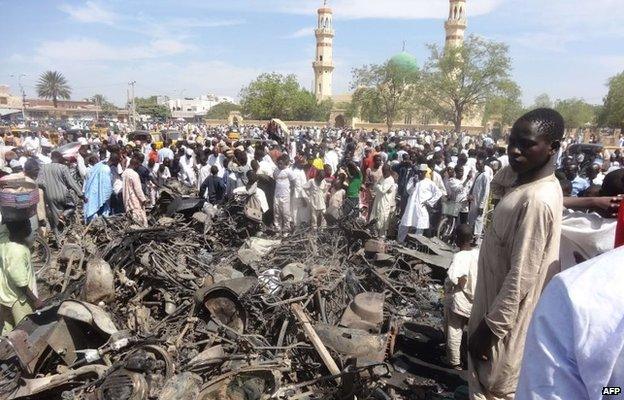
Thousands of people have been killed by Boko Haram, most of them in north-eastern Nigeria
Jihadists divide the world into the "realm of Islam" (dar al-Islam), lands under Muslim rule where Sharia prevails, and the "realm of war" (dar al-harb), lands not under Muslim rule and where under certain circumstances war in defence of the faith can be sanctioned.
Muslim rulers and governments who jihadists believe have abandoned the prescriptions of Sharia are considered by them to be outside dar al-Islam and therefore legitimate targets for attack.

Why are civilians killed?
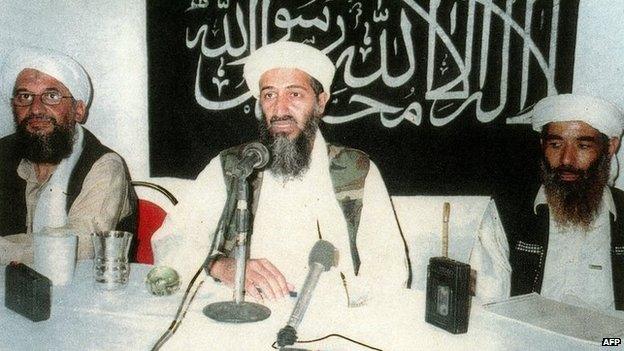
Osama Bin Laden called for the targeting of both Western soldiers and civilians
Jihadist groups targeted civilians before the emergence of al-Qaeda, but it resorted to violence against them on a scale which no other had until then envisaged.
In 1998, Osama Bin Laden and the heads of four jihadist groups in Egypt, Pakistan and Bangladesh signed a declaration of total war, external against the United States and its allies, and called for the targeting of both soldiers and civilians.
The Prophet Muhammad said Muslim armies should do their best to avoid harming children and other non-combatants. But the declaration says that killing them is an act of reciprocity for the death of Muslim civilians, external. After 11 September 2001, Bin Laden sought to justify, external attacking American civilians by arguing that as citizens of a democratic state who elected its leaders, they bore responsibility for their leaders' actions.
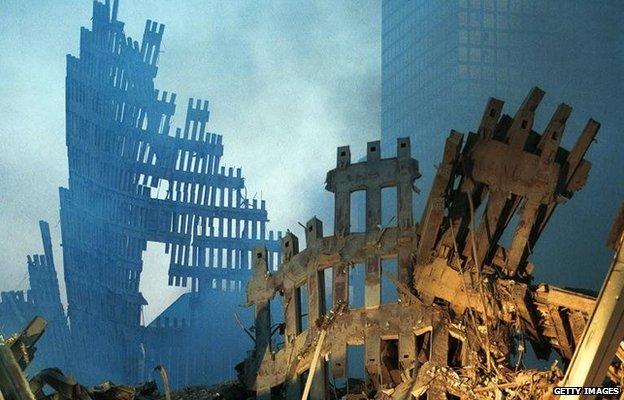
The series of attacks on the US by al-Qaeda on 11 September 2001 left 2,996 people dead
The targeting of Muslim civilians has proved more controversial. In 2005, Bin Laden's then deputy, Ayman al-Zawahiri, advised, external the late leader of al-Qaeda in Iraq (AQI), Abu Musab al-Zarqawi, that killing Shia civilians - particularly by beheading them - "won't be acceptable to the Muslim populace however much you have tried to explain it". The use of similar tactics in Iraq and Syria by Islamic State (IS), which grew out of AQI, was a factor in Zawahiri's decision to disavow the group in February 2014.

Why is the US often the main target?
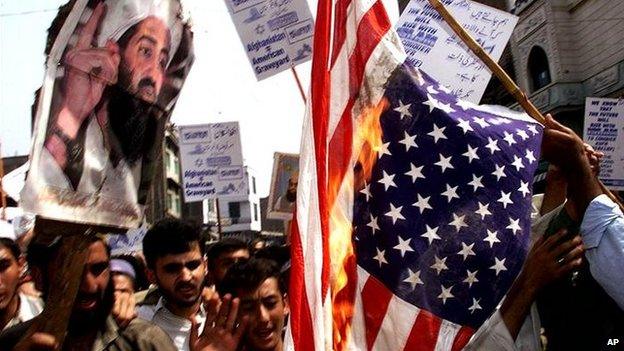
Jihadists want the United States to meet the fate of the former Soviet Union
In his 1998 declaration, Osama Bin Laden accused the US of "occupying the lands of Islam in the holiest of places, the Arabian Peninsula, plundering its riches, dictating to its rulers, humiliating its people, terrorising its neighbours, and turning its bases in the Peninsula into a spearhead through which to fight the neighbouring Muslim peoples". These "crimes and sins" amounted to a "clear declaration of war on Allah, his messenger, and Muslims", it concluded.
In 2013, two years after Bin Laden's death, Ayman al-Zawahiri wrote in his General Guidelines for Jihad, external that "the purpose of targeting America is to exhaust her and bleed her to death, so that it meets the fate of the former Soviet Union and collapses under its own weight as a result of its military, human, and financial losses. Consequently, its grip on our lands will weaken and its allies will begin to fall one after another."

How big are the Islamic states they want to establish?

Islamic State leader Abu Bakr al-Baghdadi claimed the title of "caliph" in June
Many jihadist groups seek to establish Islamic states in their respective countries of origin, such as Boko Haram in Nigeria and the Islamic Movement of Uzbekistan.
Other groups want to establish a "caliphate" - governed in accordance with Sharia by God's deputy on Earth (khalifa, or caliph) - that extends across regions. Some, like al-Qaeda, want to re-establish the caliphate that once stretched from Spain and North Africa to China and India. Its leader, Ayman al-Zawahiri, has vowed to "liberate all occupied Muslim lands and reject each and every international treaty, agreement and resolution which gives the infidels the right to seize Muslim lands", including historic Palestine, Chechnya and Kashmir.
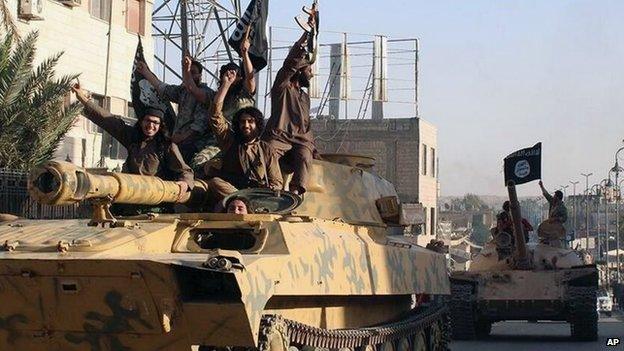
IS fighters have declared the northern Syrian city of Raqqa the "capital" of their caliphate
IS leader Abu Bakr al-Baghdadi also wants to "demolish" the borders established by the 1916 Sykes-Picot Agreement, but his group has already acted on this by declaring the creation of a caliphate that stretches across eastern Syria and western Iraq. Al-Qaeda and IS also differ in their approaches to establishing Islamic rule. Al-Qaeda's has been more long-term, while IS has immediately sought to implement Sharia in its territories.

Are there Shia jihadist groups?
While there are militant Shia Islamist groups that are jihadist in nature, they differ in many regards to Sunni groups. According to Shia tradition, mujtahids - the most senior religious scholars - have the authority to declare a "defensive" jihad. But only the 12th or "hidden" Imam - who Shia believe did not die when he disappeared 1,100 years ago - can declare an "offensive" jihad. For centuries, most Shia clerics advocated political quietism while they awaited the Imam's return. But that outlook changed in the 1960s and 1970s, giving rise to the activism that culminated in the 1979 revolution in Iran and the establishment of the Islamic Republic.
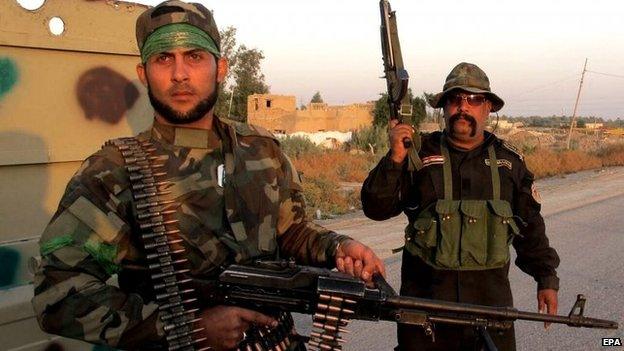
Shia militiamen have been mobilised in Iraq to counter gains by Sunni militants from Islamic State
In recent years, the sectarian nature of the conflict in Syria has seen Iranian-backed Shia groups come to the aid of forces loyal to President Bashar al-Assad, a member of the heterodox Shia Alawite sect. The groups and their thousands of "volunteer" fighters - from Iraq, Iran, Lebanon and Yemen - say they are in Syria to defend the key Shia shrine of Sayyida Zaineb in Damascus. Lebanon's Hezbollah movement has described members killed in Syria as martyrs who died "while performing jihadist duties". Similarly, the advance of IS across Iraq in 2014 saw the mass mobilisation of Shia militia to defend holy sites.